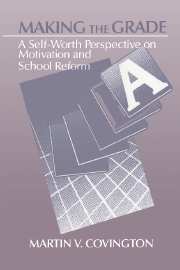Book contents
- Frontmatter
- Contents
- 1 The future and its discontents
- 2 Motives as emotions
- 3 Motives as thoughts
- 4 Self-worth and the fear of failure
- 5 Achievement anxiety
- 6 The competitive learning game
- 7 Motivational equity and the will to learn
- 8 Strategic thinking and the will to learn
- 9 An immodest proposal
- 10 Obstacles to change: The myths of competition
- Appendix A Mastery learning
- Appendix B Cooperative learning
- References
- Indexes
6 - The competitive learning game
Published online by Cambridge University Press: 05 June 2012
- Frontmatter
- Contents
- 1 The future and its discontents
- 2 Motives as emotions
- 3 Motives as thoughts
- 4 Self-worth and the fear of failure
- 5 Achievement anxiety
- 6 The competitive learning game
- 7 Motivational equity and the will to learn
- 8 Strategic thinking and the will to learn
- 9 An immodest proposal
- 10 Obstacles to change: The myths of competition
- Appendix A Mastery learning
- Appendix B Cooperative learning
- References
- Indexes
Summary
Learning is an exciting adventure – unless, of course, we go out of our way to make it unpleasant.
john krumboltzWhat is it about school life that drives the hurtful, destructive dynamics that subvert the joy of learning and create such a profound conflict between ability and effort as sources of worth? Many answers have been offered, but none comes as close to the mark as that implied by John Krumboltz's mocking challenge (1990):
Imagine how we would go about designing an educational program if our purpose were to make students hate to learn. [First, he suggests,] we would not involve them in establishing the purposes of their class. [Second,] we would require them to perform some impossible tasks – for example, to be perfect in everything they do. Third, when we discovered that the students were failing to master the impossible tasks, we would ridicule them and report their mistakes, failures and shortcomings to their friends and relatives. Fourth, just to pour some salt into the wounds, we would identify one individual in the class who was doing the tasks better than any of the others, and say, “If Frank can do it, why can't you?” This would isolate Frank and make all the other children hate him. Finally, if we should happen to catch any students helping another trying to master these impossible tasks, we would punish such cooperative behavior unmercifully, insisting that each youngster work in silent solitude separated from the support and encouragement of fellow students.
(p. 10)- Type
- Chapter
- Information
- Making the GradeA Self-Worth Perspective on Motivation and School Reform, pp. 130 - 155Publisher: Cambridge University PressPrint publication year: 1992



